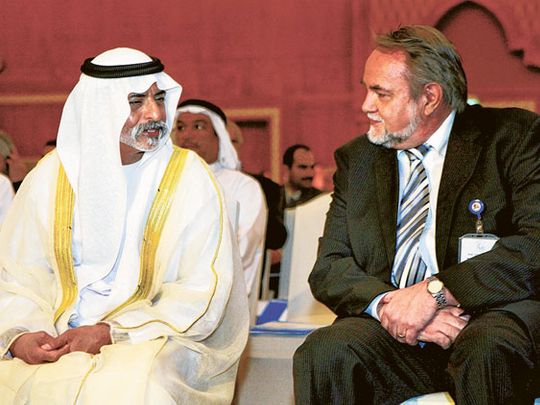
Abu Dhabi: The current political transformation in the Middle East and North Africa (Mena) has created a historic opportunity for economic and financial change guided by Sharia-compliant instruments, a leading economist said in the capital Monday.
The Islamic instruments should be invested towards the development of an entrepreneurial middle class so that long-term economic progress and job creation can be guaranteed, Dr Volker Nienhaus, economic adviser and former president of the University of Marburg, said at 19th International Conference on Investment Rules and their Impact on Economic Development.
The conference, which runs in the capital till tomorrow, yesterday saw government representatives, academicians and university students from across the Mena discuss the present global investment climate, the suitability of government rules and regulations for attracting foreign direct investment, and opportunities for economic growth.
Confidence
Shaikh Nahyan Bin Mubarak Al Nahyan, Minister of Higher Education and Scientific Research, who inaugurated the event, said the provision for an appropriate investment climate was a "fundamental requirement for instilling confidence in an economy and establishing it as a vital part of the global economy".
On the sidelines of the conference, Dr Nienhaus told Gulf News that the promotion of enterprise among the middle class was the key to ensuring regional stability.
"Middle-income entrepreneurs usually run family businesses which do not sell speculative shares on a stock exchange, and they are also less indebted. So if these entrepreneurs receive finance backed by real goods, as investments coming from Islamic instruments ideally should be, there is a real chance for long-term job creation. In addition, a middle class is integral to the creation of a sustainable knowledge economy," he explained.
Liquid capital
"In countries like Algeria and Morocco for instance, the colonialist system of capitalism still remains so that the elite are responsible for most of the enterprise and investment. In Egypt, private monopolies controlled by the wealthy replaced the public monopolies of yore. However, this elite segment is prone to shocks and volatility, which also hampers the job market greatly," Dr Nienhaus said.
A strong middle class that can provide a large proportion of the economy's total number of jobs, as is the case in the EU and the US, therefore protects against job market volatility and subsequent civil unrest.
"For Egypt to create an entrepreneurial middle class might take decades, and this is where countries like the UAE, which has an abundance of liquid capital, has an opportunity to both step in as well as benefit from the returns of the investment," he added.
He also advised the use of Sharia-compliant finance to develop Mena region economies.











